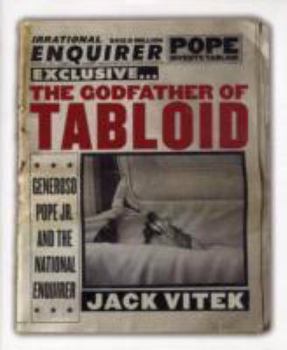The Godfather of Tabloid: Generoso Pope Jr. and the National Enquirer
Select Format
Select Condition 
Book Overview
They're hard to miss at grocery stores and newsstands in America -- the colorful, heavily illustrated tabloid newspapers with headlines promising shocking, unlikely, and sometimes impossible stories within. Although the papers are now ubiquitous, the supermarket tabloid's origin can be traced to one man: Generoso Pope Jr., an eccentric, domineering chain-smoker who died of a heart attack at age sixty-one. In The Godfather of Tabloid, Jack Vitek explores the life and remarkable career of Pope and the founding of the most famous tabloid of all -- the National Enquirer. Upon graduating from MIT, Pope worked briefly for the CIA until he purchased the New York Enquirer with dubious financial help from mob boss Frank Costello. Working tirelessly and cultivating a mix of American journalists (some of whom, surprisingly, were Pulitzer prize winners) and buccaneering Brits from Fleet Street who would do anything to get a story, Pope changed the name, format, and content of the modest weekly newspaper until it resembled nothing America had ever seen before. At its height, the National Enquirer boasted a circulation of more than five million, equivalent to the numbers of the Hearst newspaper empire. Pope measured the success of his paper by the mail it received from readers, and eventually the volume of reader feedback was such that the post office assigned the Enquirer offices their own zip code. Pope was skeptical about including too much celebrity coverage in the tabloid because he thought it wouldn't hold people's interest, and he shied away from political stories or stances. He wanted the paper to reflect the middlebrow tastes of America and connect with the widest possible readership. Pope was a man of contradictions: he would fire someone for merely disagreeing with him in a meeting (once firing an one editor in the middle of his birthday party), and yet he spent upwards of a million dollars a year to bring the world's tallest Christmas tree to the Enquirer offices in Lantana, Florida, for the enjoyment of the local citizens. Driven, tyrannical, and ruthless in his pursuit of creating an empire, Pope changed the look and content of supermarket tabloid media, and the industry still bears his stamp. Grounded in interviews with many of Pope's supporters, detractors, and associates, The Godfather of Tabloid is the first comprehensive biography of the man who created a genre and changed the world of publishing forever.
Format:Hardcover
Language:English
ISBN:0813125030
ISBN13:9780813125039
Release Date:September 2008
Publisher:University Press of Kentucky
Length:296 Pages
Weight:1.20 lbs.
Dimensions:1.1" x 6.6" x 7.8"
Grade Range:Postsecondary and higher
Customer Reviews
1 rating
The story behind a cultural icon
Published by Thriftbooks.com User , 16 years ago
Jack Vitek has written a fascinating biography of the peculiar founder of The National Enquirer, Generoso Pope and, at the same time, a biography of the American icon that he spawned. Pope was the son of a powerful Italian-American who lived in New York. Pope senior was purported to be connected --- or as some people say --- associated with the Mafia. This connection would later provide seed money with which to start the National Enquirer. A young Roy Cohn was a friend of the young Pope junior. And he too would contribute money to found the paper. It is thought that the majority of the money came from the infamous Frank Costello, a New York gangster who rose to the top of America's underworld, controlled a vast gambling empire across the United States and enjoyed political influence like no other La Cosa Nostra boss. He was called "The Prime Minister of the Underworld." It is into this world that Vitek takes us right from the beginning of the book. Vitek is an associate professor of journalism and English at Englewood College in Madison, WI. So one would assume his interest in this subject would be his natural curiosity of this tremendously successful, yet little written-about publication. When I was a young freelance writer, I wrote for The National Enquirer. I was deeply impressed with the fact that it was harder to get a story published in the Enquirer than any other publication I wrote for, including the newspaper I was on at the time. The reason? They checked their facts so well. When I discovered that, I had a new respect for them and I tended to (and still do) believe most of what I read in the paper. Pope ran the publication with an iron hand. Every reporter and editor had a hot line, a private phone, on his or her desk. That phone was for a call from Pope. When a reporter got that call, he stopped doing whatever he was doing, regardless of how important it was. A summon to see Pope came before anything else. No one called him his nickname, Gene or by anything but Mr. Pope of G.P. In the beginning, Pope published gore. He discovered that was what people wanted and would pay for. He also published articles that may have had a grain of truth but no more than a grain. The paper later became somewhat more mainstream --- at least to the extent that it publishes true stories and it does check facts. That may be the reason the circulation is less than it was in its "gore" days. Pope was an illusive and private man. He had very little sense of humor. And certainly during his lifetime, he did not get the attention or respect that such people as William Randolph Hurst and Rupert Murdock got. Yet he accomplished as much and earned as much money. His was as important a publication as any in America. I generally don't enjoy books written by professors or people with Ph.D degrees as they tend to be academic and stuffy. This book, however, is well written. He did a number of telephone interviews with people who knew, and in most cases, work fo







